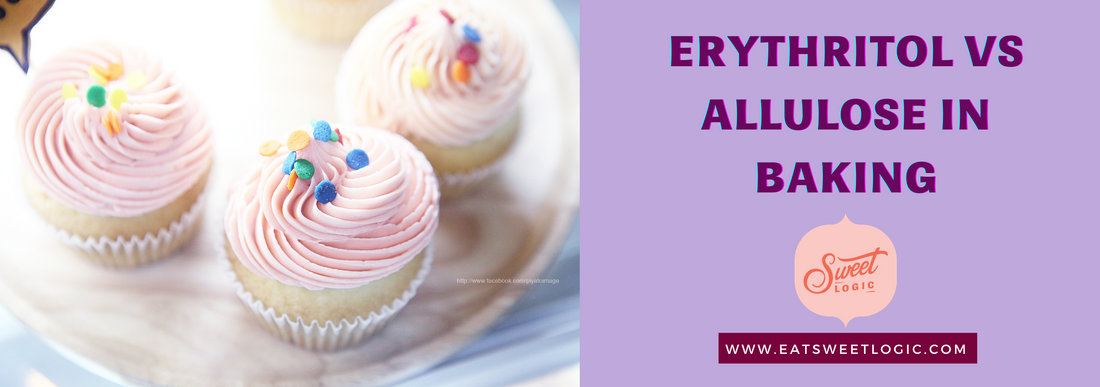Erythritol vs Allulose
Baked goods are amazing – they can be some of the most delicious foods and they offer versatility in your nutrition, too!
Today we’re going to talk about how you can get the fantastic sweet tastes of baking without the injurious effects of too much sugar. We’re going to do this by talking about non-nutritive sweeteners – specifically erythritol and allulose.
What are these compounds? What are their benefits and drawbacks? How can you integrate them into better healthy baking? These are just some of the key questions we’ll be discussing today and – if you want amazing taste with better health – you’ll want to read on!
Baking without sugar
The point of using non-nutritive sweeteners in baking is that sugar is a key contributor to over-eating and diabetes risks. These are obviously worth avoiding, so baking with less sugar is a more responsible way of controlling your nutrition.
Replacing sugar with low- or zero-calorie sweeteners is a great way to take the sting out of these problems while ensuring that everything feels and tastes like the baked treats you’re used to. This can help keep you on-track with your diet and even supports a better nutritional profile without giving up your favorite foods.
The obvious challenge is that sugar isn’t just a taste in baking: it’s a significant factor in the taste, texture, and composition of baked goods. So, clearly, you need to be considerate of what you’re taking out and what you’re replacing it with.
We’re big fans of non-nutritive sweeteners like erythritol and allulose and what they can do to provide the benefits of sugar without the major problems. We’ll outline why, and then discuss our favs (erythritol and Allulose) and how they compare for baking.
Sugar alternatives: their value and role
The point of a sugar alternative is to provide sweetness without anywhere near the calorie-content or insulin-response seen in traditional fructose/sucrose sugars. These come in many varieties – both natural and synthetic – and they’re often treated unfairly because they’re ‘too good to be true’.
These are compounds that provide sweetness comparable to sugar (some are sweeter, some less so), all while providing a fraction of the calories. This obviously makes them a great alternative to reduce the calorie and sugar content of your baking without sacrificing taste or sweetness where it matters.
However, these sugar alternatives aren’t all equally effective for baking. Earlier compounds were imperfect for their effect on insulin or their digestive burden, while newer synthetic and natural compounds are both safer, healthier, and even pro-actively improve health!
Erythritol and Allulose are two of our favorite and most commonly-used sweeteners for baking and we’re going to discuss what they’re for and how they work…
Erythritol and Allulose: what are they
Erythritol
Erythritol is a sugar alcohol that is low in calories and carbs, reducing the insulin effect of sweetness and bringing down the overall calorie count of any baked goods.
Erythritol is one of the best sugar alcohols to use for baking if you tolerate Sugar alcohols well (not everyone does!) It is zero calorie because it’s not digested by your body. It just passes through your gut. This also means that Erythritol has no Glycemic Index and won’t raise your blood sugar at all. Not all sugar alcohols are zero calorie and zero GI.
Erythritol is also granular just like sugar and behaves similarly to sugar in your recipes. In baked goods it has a faithful texture to sugar and it's easy to find and reasonably inexpensive compared to some non-nutritive sweeteners. Make sure you buy from a quality source and get a Non-GMO product.
The physical properties of erythritol are great for controlling your baked goods and can be used to make some truly tasty treats. Erythritol does have some downsides though so read on!
We mentioned Erythritol doesn't have any calories or carbs which is great! But, all that extra fiber floating through your digestive tract can cause some issues. Many people experience bloating and discomfort from consuming sugar alcohols. While Erythritol is one of the better ones, for some people sugar alcohols won’t be a good choice at all.
We also mentioned it behaves like a sugar in your recipes. It's great in warm foods like baked goods but if you are going to use it in something that is going in the fridge or freezer be careful because Erythritol likes to be a crystal so much, it will actually form big crystals in your food! We’ve seen this the most when trying to make homemade keto ice cream.
For baked goods there are only a couple of downsides. Erythritol won’t brown like sugar, so you can’t make a glaze or sprinkle it on top of some muffins to finish them off and expect the same result. It also is slightly less sweet. Erythritol clocks in around 60-70% as sweet as sugar meaning you’ll need to adjust your non-keto baking recipes to include more of this sweetener. That can cause some changes in the moisture and texture.
This also leads us to the final downside of Erythritol which is what is known as the “cooling effect”. It's similar to the effect you get from a mint with menthol in it but without the minty taste. I’ve you’ve ever tried a product with too much Erythritol in it you’ve certainly noticed this interesting sensation!
Allulose
Allulose is a new sweetener on the market but is gaining a lot of popularity, particularly with the bakers! It is a sugar compound that is naturally derived from fruits like figs and dates. It is sweeter than erythritol but still less sweet than table sugar. Typically 70-80% as sweet is a good rule of thumb if you are planning on converting an old faithful (sugarful) recipe.
This is one of the newer generations of NNS, as it doesn’t have significant digestive stress at all. To the contrary, D-Allulose is actually prebiotic and nurtures the good bacteria in the gut, which can improve your digestive health and stability, rather than damaging it. Unlike sugar alcohols, Allulose does pass through the gut wall but it's still not metabolized by your body.
Allulose has 0.4 calories per gram which isn’t nothing, but it is about 1/10th the amount you would get from table sugar! Allulose has shown to be neutral on the glycemic index so just like Erythritol it's great at avoiding the insulin spike of the traditional baked goods.
The reason Allulose has become so popular is because of its excellent resemblance to sugar. It browns like sugar, tastes and bakes like real sugar. All while avoiding and strange cooling sensations or any bitter aftertastes.
Allulose is so close to a sugar that the FDA requires it to be called a sugar on all nutritional information (this is hopefully changing soon!). It really is a low-calorie low-carb sugar instead of a “sugar substitute”
Which is best and why?
We are partial to Allulose for our baked goods and use it in all of our products. We love the flavor that it brings and the way it makes our cakes light and fluffy just like the real thing. We used to bake with Erythritol before we found Allulose, but now that we’ve tried it… we wouldn't go back.
If you like to bake at home pick up a little allulose and try it out in your favorite recipe and let us know what you think! Share your experiences and favorite recipes below in the comments.
We only use allulose in our products and we also sell bulk allulose for you to use in your own recipes!









5 comments
I’ve tried to bake with allulose a few times, but for some reason it always comes out gummy if I use a one-to-one ratio despite the fact that it’s not sweet. It also doesn’t let anything I bake with it rise.
If I have a recipe that calls for 4TBS of Erythritol how much Allulose would I use?
I used Allulose in baking and it browns too quickly, even the interior of the cake was beginning to darken. Do baked goods bake more quickly with Allulose? Should a lower temp be used instead of what the recipe suggests?
Does Allulose crystalize in refrigerated desserts/pies as Swerve does. I’ve made incredible pies/desserts with Swerve….only to find out that the product s have crystalized after refrigeration. Please help!
Thanks!
Ardis Rider
ardis1219@embarqmail.com
Does Allulose crystalize after refrigeration? Need to find a product that doesn’t. Swerve does!!!